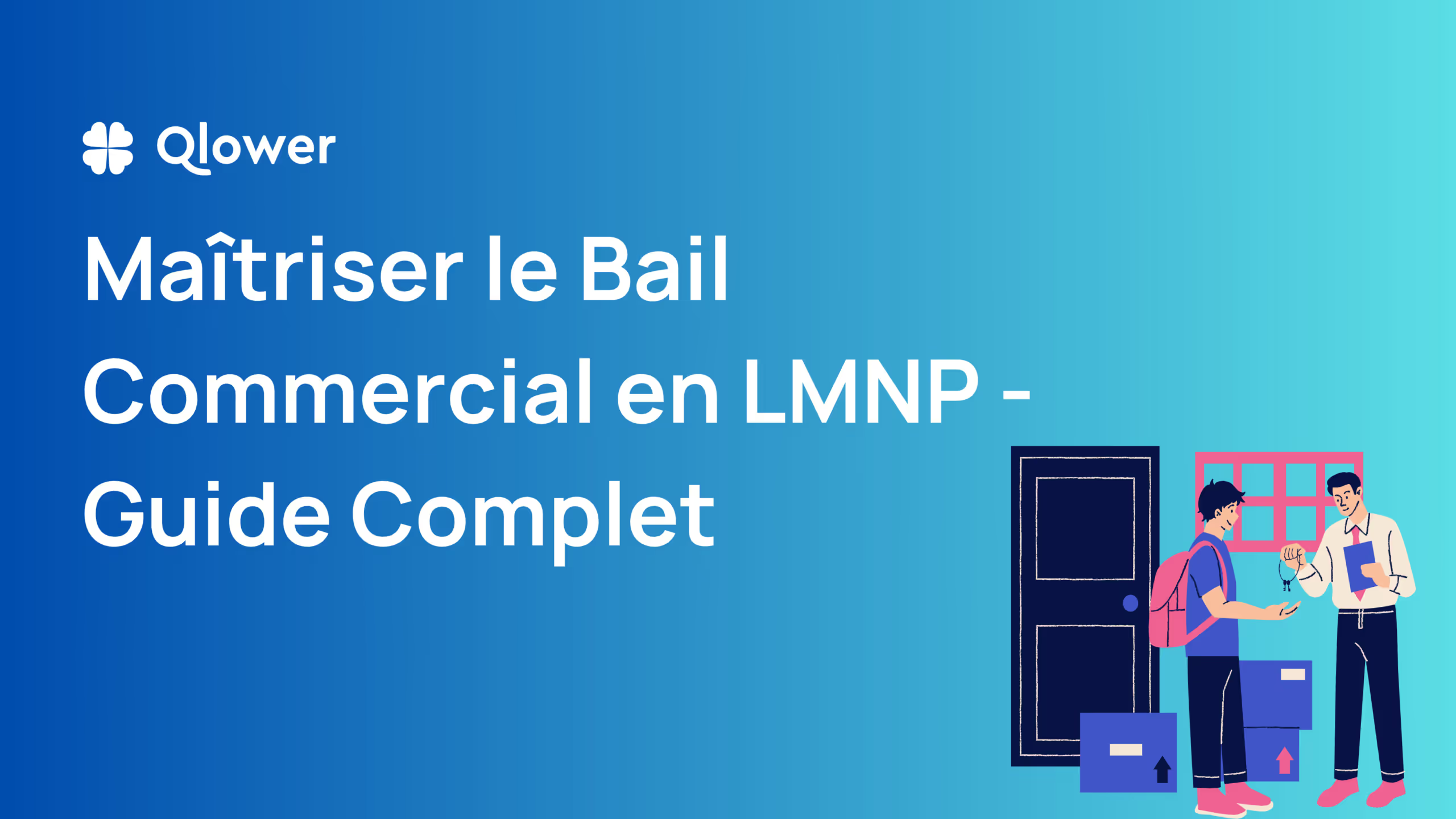Mastering commercial leases in LMNP - Complete Guide
The commercial lease in LMNP is distinguished by its ability to offer simplified rental management, rental income security, as well as considerable tax advantages. Whether you are new to investing or an experienced real estate professional looking to improve your portfolio, this detailed guide will guide you through every stage of your investment journey.
What is a commercial lease in LMNP?
The commercial lease in Non-professional furnished rental (LMNP) is a real estate rental formula that combines the advantages of a rental investment with those of operating a service residence (These residences can be student, senior, tourist or business residences). This type of lease is distinguished by its contractual, fiscal and operational specificities, making it attractive for real estate investors, especially those starting out in LMNP or experienced owners.
How commercial leases work in LMNP
With the rise in popularity of investments in service residences, such as student residences, nursing homes, or tourist residences, commercial leases in LMNP are proving to be a strategic option for investors wishing to combine tax advantages, simplified management and income security. Whether you are a beginner LMNP investor, an experienced owner or a real estate professional, we are here to explain the essential aspects of this type of lease.
Characteristics and essential clauses of commercial leases in LMNP
The commercial lease in LMNP is distinguished by its specific characteristics and clauses. This contract, binding the owner to a manager, defines the terms of operation of the service residence. Among the essential clauses, we find:
- Length of lease : generally, these leases are concluded for a period of 9 to 12 years, ensuring a certain stability for the investor.
- Royalty : fixing a rent or royalty, often indexed to an index (such as the IRL), which guarantees regular income to the owner.
- Distribution of burdens : the lease specifies the distribution of operating, maintenance and work expenses between the lessor and the operator.
- Rent guarantee clause : some clauses may include a guarantee of rent payments, which secures the owner's income.
Duration, renewal and termination of the commercial lease in LMNP
The duration of a commercial lease in LMNP is generally between 9 and 12 years, offering long-term visibility for both parties. Regarding renewal, the lease may be renewed tacitly or require a new agreement between the owner and the manager. In the event of termination, the contract must stipulate the terms and conditions, including any compensation due to the manager or owner.
The role and obligations of the parties in a commercial lease in LMNP
Role and obligations of the owner (lessor)): the owner undertakes to provide a property in good condition and to respect the contractual obligations related to the lease. He must also ensure compliance with the standards and regulations in force, and to assume the major works relating to the structure of the building.
Role and obligations of the manager (operator) : the operator is responsible for the daily management of the residence, including the rental of units, maintenance, and the provision of ancillary services. He must also respect the financial conditions established in the lease, such as the payment of rent and loads under the terms agreed upon.
Advantages of commercial leases in LMNP
Commercial leases in LMNP have several significant advantages for investors, owners and managers. These advantages make this type of lease an increasingly popular option in the furnished real estate sector.
Rent security and guarantee
One of the major advantages of commercial leases under LMNP is the security and guarantee of rents. In this model, the owner signs a contract with a professional operator who undertakes to pay a fixed rent, often indexed to an index, regardless of the actual occupancy of the residence. This ensures a stable and predictable flow of rental income for the owner, while minimizing the risks of unpaid bills and rental vacancies.
Delegated and simplified management
Delegated management is another significant advantage of commercial leases in LMNP. In this scheme, the professional manager takes care of all the operational management of the residence, including the search for tenants, the maintenance of the property, the provision of services and the management of administrative and legal aspects. This delegated management allows the owner to free himself from the constraints associated with the daily management of the rental, which is particularly advantageous for those who do not wish to be actively involved in the management of their real estate investment.
Tax benefits and VAT recovery
Commercial leases under LMNP also offer considerable tax advantages. Owners benefit from a favorable tax regime with the possibility of amortizing the property and furniture, as well as deduct expenses related to the operation of the rental. Also, in some cases, the owner can recover VAT on part of the initial investments (furniture, work, etc.), these optimizations can raise the net fiscal return above 10% in some cases!
Disadvantages and precautions associated with commercial leases in LMNP
Although commercial leasing in LMNP has many advantages, it is essential to be aware of its disadvantages and to take certain precautions to minimize the risks.
Risks and limits of flexibility
Commercial leases in LMNP can involve risks and limits in terms of flexibility. The duration of the lease, which is generally long, can limit the owner's ability to regain control of the property for personal use or to sell it. In addition, in the event of financial difficulties on the part of the operator, the owner may end up with unpaid rents or poor management of the residence. It is therefore important to choose a reliable manager and to prepare for scenarios of change of operator or early termination of the lease.
Dependence on the manager
Outsourcing the management of your commercial rental to LMNP makes your life much easier... provided you find the right manager! The owner delegates a large part of the management of his property, which can lead to a loss of control over certain aspects, such as the quality of the services provided, the occupancy rate or maintenance decisions. Choose approved LMNP managers who specialize in this type of atypical rental.
Tips for minimizing risks
To minimize the risks associated with commercial leases in LMNP, here are some tips:
- Careful manager selection : choose an operator with a good reputation and solid experience in the management of service residences and LMNP.
- Careful reading of the lease : Make sure you understand all the terms of the lease, especially those concerning the distribution of expenses, renewal and termination conditions, and rent guarantees.
- Performance monitoring : regularly monitor the financial performance of the residence and the condition of the property to quickly detect any problem.
- Legal and financial advice : do not hesitate to consult experts in real estate law and taxation to assist you in your decisions
Tax and accounting aspects of commercial leases in LMNP
Commercial leases under LMNP come with fiscal and accounting specificities that are important to understand in order to optimize your investment.
Tax rules specific to commercial leases in LMNP
The LMNP status under commercial lease is governed by specific tax rules that make it particularly attractive. The revenue generated is considered Industrial and Commercial Benefits (BIC) and not property income. In particular, this allows:
- Depreciation of goods and furniture : owners can amortize the value of their real estate and furniture over several years, reducing taxable income.
- Deduction of expenses : all expenses related to the operation of the rental (maintenance, repairs, management fees, etc.) are deductible from the gross rental income.
- Attractive tax regime : depending on the level of income, the owner can opt for the Micro-Bic diet or the real diet, each offering advantages in terms of simplification and tax optimization.
Accounting management and tax declarations
The accounting management of an LMNP property under commercial lease requires particular attention. Keeping detailed accounts is essential in order to report income and expenses correctly. Tax returns include:
- Declaration of rental income : income must be declared annually on the appropriate form (2031 for the real regime, for example) and teletransmitted to the tax services.
- Monitoring depreciation and expenses : it is important to regularly monitor depreciation and deductible expenses to optimize tax reporting.
Tax optimization and expert advice for a commercial lease in LMNP
To maximize the benefits of LMNP status, it is recommended that you consult real estate tax experts. Here are some tips for effective tax optimization:
- Choice of tax regime : Depending on your situation, determine whether the micro-BIC diet or the BIC-real diet is the most beneficial for you.
- Tax planning : anticipate future tax implications, especially in the event of a change in status or changes in tax laws.
- Use of depreciation : assess depreciation with a professional in the field in order to finely simulate the 2 possible tax regimes over the long term.
Investing via a commercial lease in LMNP
Investing in a commercial lease in LMNP is a strategy that is increasingly popular with real estate investors. Here are the key steps to make your commercial lease project a reality in LMNP.
Investment process and property selection
The LMNP investment process starts with choosing the right property. It is decisive to select a property located in an area with high rental demand, such as dynamic urban areas or tourist centers. Criteria such as proximity to amenities, the quality of the building and the presence of services (such as transport, shops, etc.) play an essential role in the success of the investment. Next, it is necessary to analyze the profitability potential of the property and ensure that it corresponds to the investment objectives, whether in terms of rental income or potential long-term added value.
Financing and financial arrangements
Financing is a key step in investing in LMNP. Numerous options are available, such as the classic home loan or leasing.
- As with a “classic” real estate purchase, a personal contribution is not mandatory but recommended between 20 and 30% to obtain the best mortgage conditions from banks.
- From a fiscal point of view, borrowing is even interesting since loan interest and credit-related expenses are deductible from the rents received.
- One SCI assembly can also be put in place, the shares then serving as a contribution that can be financed in part via a loan in fine.
Taking into account today's high interest rates, repayment periods and required guarantees is essential to optimize the cost of credit and the overall profitability of the investment.
Profitability and return on investment calculation
On average, the gross profitability of a commercial LMNP varies between 4% and 6% according to the sectors. But thanks to tax depreciation and especially to the recovery of VAT, the net return can sometimes exceed 10%, which makes it a very attractive investment.
The ROI takes into account not only net rental income, but also the potential added value upon resale of the property. To calculate profitability, it is necessary to analyze the expected rental income, deduct expenses (loan interest, management fees, taxes, etc.) and take into account the depreciation of the property. A good LMNP investment should offer a higher return than traditional investments.
An expert in real estate or rental taxation will be able to carry out a personalized tax simulation in order to accurately estimate your return on investment for a given project.
Termination and end of commercial lease in LMNP
Any commercial lease ends sooner or later! We explain to you the conditions and consequences of terminating your commercial lease under LMNP, taking into account the legal aspects and the implications for the parties concerned.
Procedures and conditions for terminating a commercial lease in LMNP
The termination of a commercial lease in LMNP may be initiated by the lessor or the operator, but it must respect contractual and legal conditions. Key reasons for cancellations include:
- Non-performance of contractual obligations
- The end of the lease term
- Strategic reasons (reconversion, sale of the property, etc.)
- Some specific events occur (death, disability, retirement...)
Early termination should be managed carefully to avoid disputes. Both parties must respect the notice periods, which are often set at several months, and the terms of termination provided for in the lease.
Management of the end of the commercial lease and conversion of the property
As the end of the commercial lease approaches, several options are available to the owner. He can rent again for a new period of 9 years for a new operator, or reconvert the property for another use (traditional rental, sale, etc.). Reconversion requires an assessment of market opportunities, an estimate of the value of the property, and sometimes renovation or upgrading work.
Legal aspects and possible indemnities
In the event of termination or non-renewal of the lease, compensation may be due to either party, depending on the terms of the contract and the circumstances of the termination. These indemnities, often called eviction benefits, are intended to compensate the operator for the loss of business. It is important to consult a legal expert to ensure that all legal aspects are properly managed and to avoid costly litigation.
The LMNP commercial lease represents an interesting opportunity for investors wishing to start a furnished rental business while benefiting from delegated management and tax advantages. With a thorough understanding of its mechanisms, advantages and challenges, such as the solidity of the operator, investors can take advantage of this model to make profitable investments in furnished real estate.





